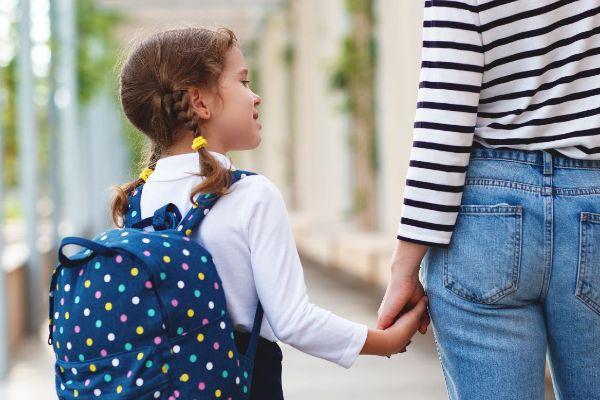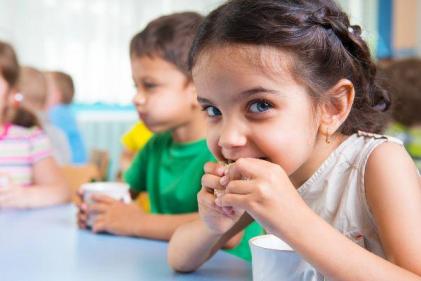The move from pre-school, nursery or home into the primary school marks a new chapter in your child’s life. It is a real milestone bringing many exciting opportunities and the chance to make lifelong friendships for you and your child.
Sarah West, Marketing and Communications Manager of charity Parentkind, shares her tips for being prepared for what lies ahead. Parentkind runs the ‘Be School Ready’ campaign, helping parents and kids get their school life off to a flying start.
-
Be positive about starting school
Reading your child books about starting school, talking about the characters and the situations they find themselves in, can really help them to understand what happens at school and to recognise and express some of their own feelings about starting school. Talking about your own school days can bring on fits of giggles and lots of excitement too. Teach your child some of your old playground games and dig out your class photos – challenge them to pick you out from the line up.
-
Develop independence
At school they’ll need to do things themselves, so it’s a good idea to get them practicing these things at home – be patient with them while they’re learning, everyone progresses at their own pace, so don’t forget to celebrate the little achievements. Encourage your little one to practise getting dressed and undressed, into and out of their school uniform, coat and P.E kit. To make it easier for them, look for Velcro shoe straps and elasticated waistbands or clip-on ties; fiddly buttons and laces can be tricky at their age.
Playing games like shops, cafes and schools are a fun and relaxed way for children to practise skills like packing their school bags or carrying plates, cutlery and a cup on a tray. Encourage them to use the toilet independently and remind them of basic hygiene rules - little fun prompts like making a hedgehog with their hands when washing them, will help them do it properly.
-
Get used to the new surroundings
Going along to events at your child’s new school, like the summer fair, can help both you and your child get used to your new surroundings before school starts. Take part in the settling in or welcome events for new starters if you can – they’re a great way for you to get to know other parents and the staff beforehand, so that you are familiar with the people who will be looking after your child.
You could also do a ‘dry run’ of your route to school, just as if it was the big day itself, so that your child understands where they’re going and gets used to the journey they’ll soon be taking every day.
-
Get organised
It’s not just your child that is preparing for a new routine. Being able to manage all the new things that come with school is just as important for you. There’s a surprising amount of admin to deal with - letters and forms come home every week so it’s important to keep on top of these. Read the newsletters, familiarise yourself with the school website and note dates on your calendar. Remember to share information with everyone involved in your child’s care.
-
Buy in bulk and label EVERYTHING
Kids can get really messy in primary school, especially in the earlier years, so stock up on some spare uniform. Supermarkets generally have a good budget selection.
Once you have all that new uniform, the last thing you want is for it to end up in the lost property box, so make sure you label everything. It doesn’t matter how you choose to label their uniform but labels with little pictures can be really helpful for children who don’t recognise their name written down yet.
-
Be positive and calm
Both you and your child will have a lot to learn once they start school. Accepting that they have to become more independent can be really difficult, but if they can see you are positive about their new adventures (even if you’re not inside) then it will make them less anxious. If you have any worries, talk to their teacher, school office, or head teacher - they are there to help.
My top tip for their first day is to make sure you don’t stick around at drop off; it’s generally best to leave them to it and have a box of tissues ready at home – just in case of tears… yours, not theirs.
-
Get involved in school life
As a new parent, volunteering for the PTA, helping in class, or joining a Parent Council, are all great ways to be more involved with the school. By attending meetings and get-togethers, you will soon get to know other parents and learn more about the day-to-day running of the school. What’s more, children always like to see their parents participating and being part of the school community.
If you can’t make it through the school gates because of work or other commitments, don’t worry, you can still get involved and stay in touch by joining school social media groups. This a great way to keep up to date with what’s going on when you can’t be there in person.
-
It’s not a race
I’d recommend trying to avoid playground discussions about whose child can already read or count – your child will develop at their own pace. The qualities that matter most in pupils are things like curiosity, independence, imagination, and enjoying playing and sharing with other children.
Making sure that you and your child feel ‘school ready’ will help the whole family adapt to this new chapter in your lives. Showing an interest in your child’s education right from the start is a great way of helping them settle. What’s more, research shows parents who are involved in their child’s education can truly make a difference, helping them to reach their potential academically, behaviourally and emotionally. So stay positive, calm and enthusiastic about school – it will go a long way to making your child feel happy about their new adventure.
For further information visit parentkind.org.uk or for more top tips for parents, follow us on Facebook.









